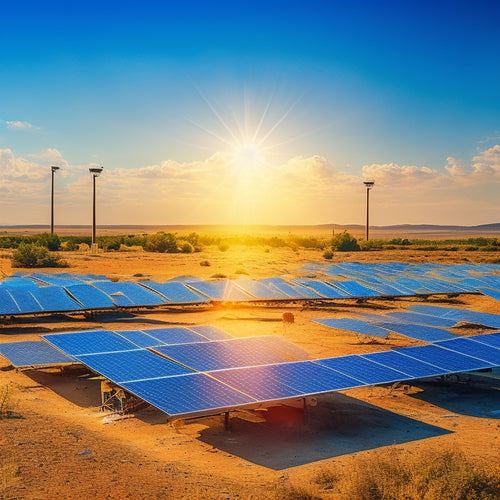
3 Best Eco-Friendly Water Pumps for Off-Grid Living
Share
You're looking for an eco-friendly water pump that suits your off-grid living needs, and your options range from solar, wind, and hydro power, each with their own advantages and ideal applications. Solar pumps are ideal for small-scale irrigation, while wind pumps are suitable for larger-scale water supply. Hydro pumps are perfect for areas with abundant water resources. When choosing a pump, consider factors like pump efficiency, water quality, operating conditions, and maintenance. You'll want to evaluate your water requirements, energy sources, and budget to find the best fit. Explore your options further to discover the perfect pump for your off-grid lifestyle.
Key Takeaways
• Consider solar, wind, or hydro power options for off-grid water pumping needs, depending on available energy sources.
• Evaluate pump efficiency, including flow rate, pressure, and power consumption, to ensure optimal performance.
• Choose a pump that meets water quality standards, with features like contaminant removal, filtration, and UV purification as needed.
• Ensure the pump is compatible with the water source, whether it's a well, spring, or rainwater harvesting system.
• Look for pumps with easy maintenance features, such as simplicity in design and accessibility for repairs, to minimize downtime.
Top Eco-Friendly Water Pump Options
When it comes to off-grid living, selecting the right eco-friendly water pump is essential, and you have several excellent options to explore, including those that harness solar, wind, or hydro power. These innovative pumps not only reduce your carbon footprint but also provide a reliable source of water for your off-grid homestead.
You'll find that solar-powered pumps are ideal for small-scale irrigation systems, while wind-powered pumps are perfect for larger-scale water supply needs. Hydro-powered pumps, on the other hand, are suitable for areas with abundant water resources.
Regardless of the type you choose, it's vital to prioritize pump maintenance to ensure peak performance and extend the lifespan of your pump. Regular checks on the pump's electrical components, lubrication, and seals can prevent corrosion and wear.
Additionally, implementing water conservation strategies, such as using low-flow fixtures and fixing leaks, can greatly reduce water waste and minimize the load on your pump. By combining the right eco-friendly pump with responsible water management, you'll be well on your way to a sustainable off-grid lifestyle.
Key Features to Consider
As you evaluate eco-friendly water pumps for your off-grid homestead, take into account the following key features to guarantee you select the most suitable option for your specific needs.
When it comes to pump efficiency, you'll want to think about the pump's flow rate, pressure, and power consumption. A pump with high efficiency will reduce your energy costs and minimize your environmental impact.
| Feature | Considerations |
|---|---|
| Pump Efficiency | Flow rate, pressure, power consumption |
| Water Quality | Contaminant removal, filtration type, certification |
| Operating Conditions | Temperature range, humidity tolerance, noise level |
Additionally, think about the water quality you need to achieve. Do you require a pump that can remove contaminants, sediment, or bacteria? What type of filtration is necessary for your water needs? Make sure the pump you choose meets your water quality standards.
Lastly, consider the operating conditions of the pump. Will it be exposed to extreme temperatures, humidity, or noise levels? By evaluating these key features, you'll find the perfect eco-friendly water pump for your off-grid homestead.
Choosing the Right Pump
With your specific needs and the key features in mind, you can now narrow down your options and select the ideal eco-friendly water pump for your off-grid homestead. When choosing the right pump, consider your water requirements, energy sources, and budget. You'll want to guarantee the pump you choose is compatible with your water source, whether it's a well, spring, or rainwater harvesting system.
Pump maintenance is essential to extend the lifespan of your pump and ensure peak performance. Look for pumps with easy maintenance features, such as simple filter cleaning and replacement. Additionally, consider the water quality you need for your off-grid homestead.
If you need potable water, choose a pump that can handle water treatment and filtration. Some pumps come with built-in UV purification or can integrate with external filtration systems.
Frequently Asked Questions
Can I Use a DC Water Pump With an AC Power Source?
"As you navigate the world of water pumps, you're wondering if you can harness the power of a DC water pump with an AC power source. The answer lies in a DC inverter, which converts AC power to DC, enabling seamless power conversion."
How Do I Winterize My Eco-Friendly Water Pump System?
To winterize your eco-friendly water pump system, you'll want to prioritize freeze protection by draining the pump and pipes, insulating exposed components, and conducting regular winter maintenance checks to guarantee a smooth flow when temperatures rise again.
Are Eco-Friendly Water Pumps Suitable for High-Pressure Systems?
When designing a high-pressure system, you'll need to guarantee your eco-friendly water pump can handle the demand; look for pumps with built-in pressure regulation or consider a system design that integrates a separate pressure tank.
Can I Install an Eco-Friendly Water Pump Myself or Hire a Pro?
'Did you know that 75% of homeowners attempt DIY projects, but only 60% complete them successfully? When it comes to installing an eco-friendly water pump, you'll face DIY challenges like complex plumbing and electrical connections, but hiring a pro guarantees Professional Benefits like warranty-backed work and peak performance.'
Are Eco-Friendly Water Pumps Compatible With Rainwater Harvesting Systems?
You can seamlessly integrate eco-friendly water pumps with rainwater harvesting systems, as they're designed to work together, efficiently filling your water storage tanks through various harvesting methods, such as rooftop collection and ground-based systems.
Related Posts
-

Top Eco-Friendly Camping Equipment for a Sustainable Adventure
When you're camping with the planet in mind, opt for eco-friendly gear like tents made from recycled materials and bi...
-

Smart Home Thermostats to Revolutionize Your Space
Smart home thermostats revolutionize your space by providing precise temperature control and optimizing energy saving...
-

What Happens Without a Charge Controller in Solar Panels
Without a charge controller in your solar panel system, you risk overheating batteries due to overcharging, which can...


